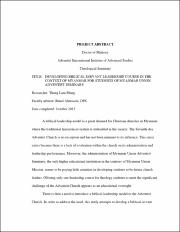Developing Biblical servant leadership course in the context of Myanmar for students of Myanmar Union Adventist Seminary
Abstract
A biblical leadership model is a great demand for Christian churches in Myanmar
where the traditional hierarchical system is embedded in the society. The Seventh-day
Adventist Church is no exception and has not been immune to its influence. This crisis
exists because there is a lack of evaluation within the church on its administration and
leadership performance. Moreover, the administration of Myanmar Union Adventist
Seminary, the only higher educational institution in the territory of Myanmar Union
Mission, seems to be paying little attention in developing students to be future church
leaders. Offering only one leadership course for theology students to meet the significant
challenge of the Adventist Church appears as an educational oversight.
There is then a need to introduce a biblical leadership model to the Adventist
Church. In order to address the need, this study attempts to develop a biblical servant
leadership course for students of MUAS. In doing so, documentary research and need
assessment survey are utilized to evaluate the immediate context of the study.
In the survey, 53 individuals completed the survey questionnaires. The
respondents include the MUAS church members, including former MUAS board
chairpersons and members; current students and alumni of MUAS; and current
administrators, faculty, and staff of MUAS. Almost half of the respondents are studying
outside the country by the time they completed the survey questionnaires.
The survey data indicated that the Adventist Church leaders have a hard time to
follow biblical leadership model because of the great influence of the long dictatorial rule
in the country, which had changed the whole social system. According to the data, the
leaders are strong in spirituality, but they have been found weak in practicing biblical
leadership principles. This survey affirms the need of introducing a biblical servant
leadership course in MUAS.
This study culminates with a biblical servant leadership model that is designed for
a teaching course, with the eight most dominant servant leadership characteristics that
come out as a result of the survey. The characteristics include spirituality, love, humility,
integrity and trust, vision, developing leaders, teamwork, and service. Each leadership
characteristic serves as a topic of the lessons of the course.


